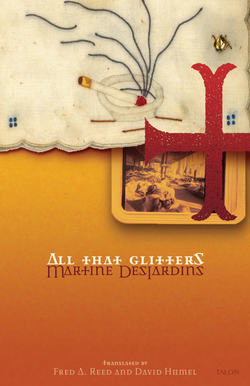Читать книгу All That Glitters - Martine Desjardins - Страница 8
На сайте Литреса книга снята с продажи.
ОглавлениеII
THE CANADIAN CONTINGENT has been stationed at Salisbury for well onto two months now, in the middle of a plain swept by howling winds. Since we arrived on October 20, it has been raining without respite. I counted fifty-five days of downpour to eight grey days—a typical English winter, despite the assurances of the locals, who claimed the region had not seen such bad weather in living memory. A thousand of the 35 thousand recruits have already been repatriated with meningitis.
Such were the conditions in which we prepared ourselves for the greatest game of all, as Kipling put it. Our daily routine consisted of marching back and forth to the music of a military band, shouldering broomsticks for lack of rifles, running through sandbags with our bayonets, firing off two or three shots at a target that only our eagle-eyed Mohawk snipers could hit.
As time passed, discipline began to slacken. The men lined up unkempt at muster, stood at ease as the flag was being raised, saluted their officers in cavalier fashion—when they saluted them at all. The Highlanders took great pleasure in driving around the encampment, kilts tucked up, on top of a double-decker bus plastered with advertisements for My Lady’s Dress at the Royalty Theatre. When fatigue duty sounded, the gamblers would seek refuge in my tent, drawn by the warmth of the rum and the games of 421. It would have been unseemly of me to complain of their company, particularly since I contrived to divest them of their meagre resources. I must confess, though, that I did not feel the same intensity I’d experienced at Stonehenge in the company of the nurse. Perhaps the sole exception had been the night before, when a powerful gust had wrenched the tent from its moorings and the sodden canvas collapsed about our heads, forcing us to chase after the wind-strewn bank notes like so many chickens.
The British majors who would inspect us from time to time dubbed us “The Stonehenge Circus.” In their opinion, we might possibly be made into mediocre soldiers at best, providing that our mascots were shot. By mascots, they meant our officers.
An unskilled worker always blames his tools, but still, the equipment we had been issued was unlikely to aid our cause. My boots with their composition soles, conceived for the Boer Wars fought in the Transvaal, had already begun to disintegrate. The constant rain had shrunk my uniform, and it was now coming unstitched at the seams. My khaki cape was indistinguishable from a mud puddle. No matter. I’ve had occasion to wear formal dress several times, and have drawn admiring glances for my elegance—none too often, mind you, but it has happened. Never before had I felt quite so dashing. With my conquering brow, my ferocious upper lip and my victorious chin, I felt rather like a one-man militia. At night, I slept fully clothed.
In my opinion, the training period was a damnable waste of time, both for us, and for those awaiting reinforcements. The newspapers were predicting that the war would be over by Christmas. I had begun to fear that I would arrive in Flanders too late for the kirmess and, most of all, for the great game to which I was destined.
